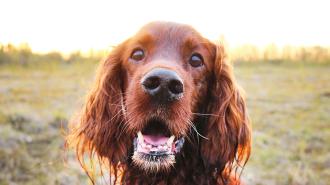An AI-based app could help reunite lost pets and their owners — by identifying a dog or cat by its unique nose print.
The challenge: If you’ve ever lost track of a beloved pet for even a few minutes, you likely know how terrifying it can be to not know where they are or if you’ll ever see them again.
An ID tag on your pet’s collar can tell anyone who finds the animal how to get in contact with you, but tags can fall off or become damaged. If your pet only wears a collar on walks, a tag won’t help if it darts out of the house unexpectedly, either.
A vet can insert a microchip into your pet that will reveal your contact information when scanned. This is a more permanent way to link you and your pet, but the insertion process is at least somewhat painful for animals, and it requires taking the lost animal to a shelter or a vet to be scanned.
The app uses three layers of AI to locate a pet’s face, identify its nose, and make sure a photo is sharp enough.
The idea: In 2021, South Korea-based tech startup Petnow teamed up with researchers at Yonsei University to develop an AI-based technology capable of identifying a dog with nearly 99% accuracy just by looking at the unique pattern of ridges and creases on its nose.
The team then integrated its nose print tech into an app designed to help reunite lost pets with their owners. The app is now available for free in the US, South Korea, and Spain, and it works for both dogs and cats (the tech instead looks at a cat’s whole face and not just its nose print).
How it works: After downloading the app, a pet owner uses their smartphone camera to scan and register their dog or cat’s face. The pet should be at least six months old — that’s the age when its nose print or face is pretty much done changing.
Having a dog or cat that doesn’t want to sit still for the scan isn’t much of an issue. The app uses three layers of AI to locate a pet’s face, identify its nose, and make sure a photo is sharp enough — it will automatically take a new pic every .08 seconds until it snaps one that works.
If the owner later loses their pet, they can report it missing in the app. If someone finds a lost pet, they can use the Petnow app to scan its nose print or face. If the animal is registered, it’ll pop up in the app, and they will be able to connect with the owner.
Looking ahead: For Petnow to work, pet owners need to know to register their pets, and people who find lost animals need to know to check for the animals in the app — Petnow is now looking for pet-related businesses and organizations to help it get the word out.
The startup is also hoping to strike up partnerships with government organizations — Peter Jung, Petnow’s business development manager, told BBC News it’s hopeful the South Korean government will make registering a pet in the app mandatory to cut down on the number of strays.
The big picture: As unique as an app that identifies pets by their nose print sounds, Petnow isn’t the only company exploring the space — another Korean startup, iSciLab, is developing a similar app with the help of the Korean government and expects to wrap up testing in 2024.
It’s too soon to say whether iSciLab, Petnow, or one of the other companies developing nose-recognition apps for pets (yes, there are others) will become mandatory in Korea or elsewhere, but pet owners might adopt the tech anyways as added insurance that a lost pet will be able to find its way back to them.
We’d love to hear from you! If you have a comment about this article or if you have a tip for a future Freethink story, please email us at [email protected].






